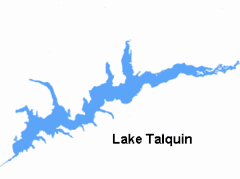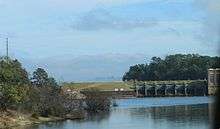Lake Talquin
| Lake Talquin | |
|---|---|
|
viewed from Wallwood Scout Camp on the north shore, looking to the northeast (October 2007) | |
 outline | |
| Location | Gadsden / Leon counties, Florida, United States |
| Coordinates | 30°23′19″N 84°38′48″W / 30.38861°N 84.64667°WCoordinates: 30°23′19″N 84°38′48″W / 30.38861°N 84.64667°W |
| Type | reservoir |
| Primary inflows | Ochlockonee River |
| Primary outflows | Ochlockonee River |
| Basin countries | United States |
Lake Talquin is a reservoir located on the Ochlockonee River between Leon County and Gadsden County in north Florida. The lake, located about 10 miles (15 km) west of Tallahassee, is south of Interstate 10 and bordered by State Road 20 on the east and State Road 267 on the west.
The lake was created by the construction of the Talquin Dam, and used for the generation of hydroelectric power. The name Talquin is a contraction of the names of the two cities the lake lies between, Tallahassee and Quincy.
History

In 1927 the Jackson Bluff Dam was constructed on the Ochlockonee River to produce hydroelectric power. The waters held back by the dam formed Lake Talquin.
On August 18, 1962, the lake was the site of a tragedy when 17 children and one adult drowned in the capsizing of a boat while they were on an outing.[1]
In 1971, approximately 20,000 acres (80 km²) of uplands and 10,000 acres (40 km²) of lake bottom were donated by the Florida Power Corporation to the State of Florida to form Lake Talquin State Recreation Area. Much of the shore of the lake is part of Lake Talquin State Forest. The waters that now cover Lake Talquin’s floodplain are shallow except along the old channel of the river. The abundance of dead trees and stumps scattered about are reminders of the rich floodplain forest that once covered the area before the lake was formed. Most of the stumps can be found right under the water on the eastern end of the lake causing problems for boaters.
The lake is unusual insofar as its easternmost point is only 11 miles from Florida's state capital of Tallahassee, yet its shores remain pristine and recreational use remains sparse even today.
Vegetation
The area has forests of pines and hardwoods including sweetgum and a variety of oaks.
Topography
Rolling hills and deep ravines surround the lake. The water level is usually at the 70-ft contour (70 feet above sea level), but it can vary by as much as 3 feet. The lake's nominal surface area is about 10,000 acres, or about 15 square miles, but because of the shallow gradient in some of the inlets and the seasonal variations in water level, it is not possible to state a more precise figure for the size of the lake.
The lake's shoreline measures more than 40 miles, and considerably more if one includes all of the nooks and crannies of the numerous inlets. Most of this shoreline is public land, and is therefore undeveloped.
Most of the lake measures approximately 1 mile in width. The total length of the lake is almost 20 miles (depending on where one decides the river ends and the lake begins).
Wildlife
Eastern gray squirrels, fox squirrels, wild turkey, bald eagles, ospreys, alligators and whitetail deer are found in the forests surrounding the lake. Also commonly seen are egrets, blue herons, water turtles of several varieties, and water snakes, including water moccasins. Insect life is abundant, and mosquitoes and chiggers in particular can be troublesome during the summer months.
Recreation
Lake Talquin State Forest encompasses much of the southern and southwestern shores of the lake, with many boat landings and picnic areas, including Rock Bluff Recreation Area in Leon County. There are facilities for private picnics, parties, family reunions, weddings and receptions.
The lake is also home to the Florida State University Crew Club, a rowing club.
Most of the shoreline and bottom is muddy rather than sandy, and swimmers need to keep in mind that they are sharing the water with alligators, turtles, and snakes (particularly at the eastern end of the lake). Only some parts of the lake are suitable for water skiing as there are many submerged stumps that are not easily visible. The lake is, however, a good spot for day-sailing and canoeing, and the scenery is beautiful.
Fishing
Lake Talquin has largemouth and striped bass, crappie, bream, shellcrackers, speckled perch, striped pickerel (commonly called "jack"), gar, catfish, and bowfin.
References
- ↑ "Seventeen Children Drown While On Church Outing", Ocala (FL) Star-Banner, August 19, 1962, p1
External links
| Wikimedia Commons has media related to Lake Talquin. |
- Lake Talquin State Park at Florida State Parks
- Ochlockonee River Watershed and Lake Talquin Protection - Florida DEP
- Lake Talquin State Park at Wildernet
- U.S. Geological Survey Geographic Names Information System: Lake Talquin